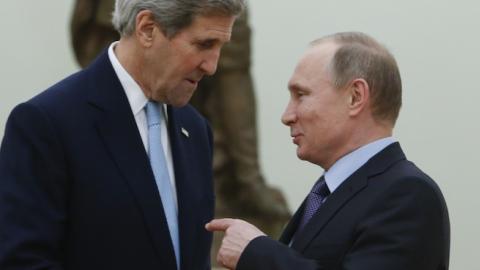According to press reports, Secretary of State John Kerry was confronted by Syrian civil-society workers at a London reception earlier this month. The activists pressed him on why the U.S. had failed to respond to the Russian and Syrian offensive near Syria’s second city of Aleppo. Exasperated, Kerry remarked, “What do you want me to do, go to war with Russia?” Such is the pattern of the Obama administration — from the Iran nuclear deal to the Syrian civil war, it has sought to press home a false choice: capitulate on core demands or escalate to major war.
This strawman is nothing less than justification for submission, the first act of which is to facilitate Russia’s campaign through a just-announced “cessation of hostilities” agreement. An honest assessment of American options would acknowledge another path: a middle way that leverages one of America’s greatest strengths — its vast reservoir of friends and allies.
The United States is at its best when it rallies our allies against our enemies. Time and again, however, the Obama administration has done the opposite. In the nuclear negotiations with Iran, for example, U.S. officials informed our allies about developments only after the fact. Moreover, by negotiating directly with Iran, the administration fractured our coalition under the pretense of expediency, allowing Iran to introduce demands late in the game with the support of Russia.
In the Syrian civil war, Kerry is committing the same grave mistake. Instead of coming to terms with our allies and leading a coalition, he has spent long hours huddled with Russian foreign minister Sergey Lavrov. Only afterwards has he deigned to inform our allies of what has already been decided; and when our friends have stood their ground, he’s responded by dialing up the pressure on them. Indeed, Kerry’s retort to Syrians frustrated by the lack of progress has been pure acid: “Don’t blame me — go and blame your opposition.” Battered and lacking support, the opposition now finds itself bound by a “cessation of hostilities” agreement that Russia will manipulate to justify its operations.
The Obama administration should stop acting as an arbiter in the war in Syria. Instead, we should jettison the role of mediator and close ranks with our allies. Such an approach would allow us to pressure our adversaries rather than clash with our partners. For President Obama, who campaigned on a chic notion of multilateralism, such an approach should be attractive; that it hasn’t been testifies to a deep-seated moral equivalency in his foreign policy between what we and our allies do and what our enemies seek to accomplish. The upshot is an Orwellian diplomacy that celebrates a “cessation of hostilities” while Russia destroys the opposition under the pretext of fighting terrorism.
By failing to support our friends against our foes, Obama and Kerry have tilted the playing field toward Russia, Iran, and Bashar al-Assad. Steadily, one bomb at a time, Vladimir Putin has hollowed out the opposition; in the process, he has imperiled America’s relationships across the region. By overtly coordinating with Syria’s Kurds, Russia has alarmed Turkey; by exacerbating the refugee crisis, it has weakened Europe; by targeting the moderate opposition, it has angered the Sunni Arabs; and, by sparing the Islamic State (ISIS), it has endangered the Western world. In one fell swoop, Putin has sown dissension between the United States and our allies and nudged Obama toward the worst choice of all: either accept Assad or acquiesce to the Syrian civil war dragging on and on.
Naturally, Obama and Kerry are tempted to side with Assad — after Paris and San Bernardino, how couldn’t they be with the Assad regime promising to fight ISIS and other Sunni radicals? In truth, however, a restored Assad would owe his survival to Russia, Iran, and a strategy of sectarianism — all of which would only grow stronger. In southern Lebanon and Western Syria, Hezbollah would attain new levels of power and influence; in Syria, Russia would gain permanent military bases to match its growing regional clout; and along the border with Turkey, Kurdish forces would consistently aggravate Ankara. Moreover, such concessions would come without the promised trade-off — just the opposite, the prospects for defeating ISIS would actually deteriorate dramatically. Al Qaeda’s Nusra Front and ISIS would attract legions of Sunnis seeking protection and revenge against Assad’s Shia sectarianism. Under pressure from the growing refugee crisis, Europe might even persuade Assad to close his borders as a condition of support. For those lucky Sunnis Arabs who manage to escape the resulting kill-zone, over-extended refugee camps in Jordan and Turkey would await. Bereft of options, Saudi Arabia and Turkey could very well intervene.
As president of the United States, Barack Obama has at his disposal a set of alliances that are the envy of the world — and that can reverse such regional deterioration. As Vladimir Putin works to undermine them, Obama should reinforce them. With the support of Saudi Arabia, Turkey, Jordan, and our other regional allies, the United States should provide meaningful protection and assistance to the moderate opposition in Syria. Such an investment will allow us to avoid the false choice of “Assad or endless war” and to meet our objectives without embroiling us in another lengthy conflict. It’s not too late to do so — no matter what Putin and Kerry will have us believe.
















